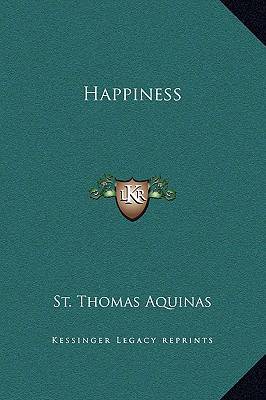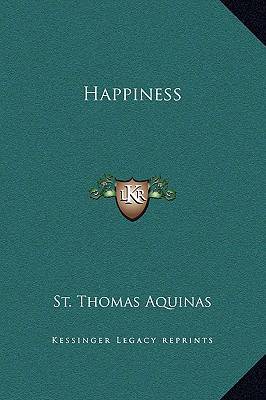
- Afhalen na 1 uur in een winkel met voorraad
- Gratis thuislevering in België vanaf € 30
- Ruim aanbod met 7 miljoen producten
- Afhalen na 1 uur in een winkel met voorraad
- Gratis thuislevering in België vanaf € 30
- Ruim aanbod met 7 miljoen producten
Zoeken
Omschrijving
Happiness by St. Thomas Aquinas is a philosophical treatise that explores the nature of happiness and its attainment. Aquinas, a renowned theologian and philosopher of the Middle Ages, argues that happiness is the ultimate goal of human life and that it can only be achieved through a life of virtue and moral excellence.The book is divided into three parts. In the first part, Aquinas defines happiness and distinguishes it from other forms of pleasure and satisfaction. He argues that happiness is not a fleeting emotion or a momentary pleasure, but a state of being that is attained through a life of virtue and moral excellence.In the second part, Aquinas discusses the virtues that are necessary for the attainment of happiness. He outlines the four cardinal virtues of prudence, justice, fortitude, and temperance, as well as the three theological virtues of faith, hope, and charity. He explains how these virtues work together to lead a person towards a life of happiness.In the third and final part, Aquinas explores the role of God and divine grace in the attainment of happiness. He argues that God is the ultimate source of happiness and that it is only through a relationship with God that true happiness can be attained.Overall, Happiness by St. Thomas Aquinas is a thought-provoking and insightful exploration of one of life's greatest questions: what is happiness and how can it be achieved? It offers a profound and timeless perspective on the nature of happiness and the virtues that are necessary for its attainment.THIS 22 PAGE ARTICLE WAS EXTRACTED FROM THE BOOK: St. Thomas Aquinas Philosophical Texts, by St. Thomas Aquinas . To purchase the entire book, please order ISBN 0766140032.This scarce antiquarian book is a facsimile reprint of the old original and may contain some imperfections such as library marks and notations. Because we believe this work is culturally important, we have made it available as part of our commitment for protecting, preserving, and promoting the world's literature in affordable, high quality, modern editions, that are true to their original work.
Specificaties
Betrokkenen
- Auteur(s):
- Uitgeverij:
Inhoud
- Aantal bladzijden:
- 24
- Taal:
- Engels
Eigenschappen
- Productcode (EAN):
- 9781169168664
- Verschijningsdatum:
- 10/09/2010
- Uitvoering:
- Hardcover
- Formaat:
- Genaaid
- Afmetingen:
- 178 mm x 254 mm
- Gewicht:
- 267 g

Alleen bij Standaard Boekhandel
+ 89 punten op je klantenkaart van Standaard Boekhandel
Beoordelingen
We publiceren alleen reviews die voldoen aan de voorwaarden voor reviews. Bekijk onze voorwaarden voor reviews.











